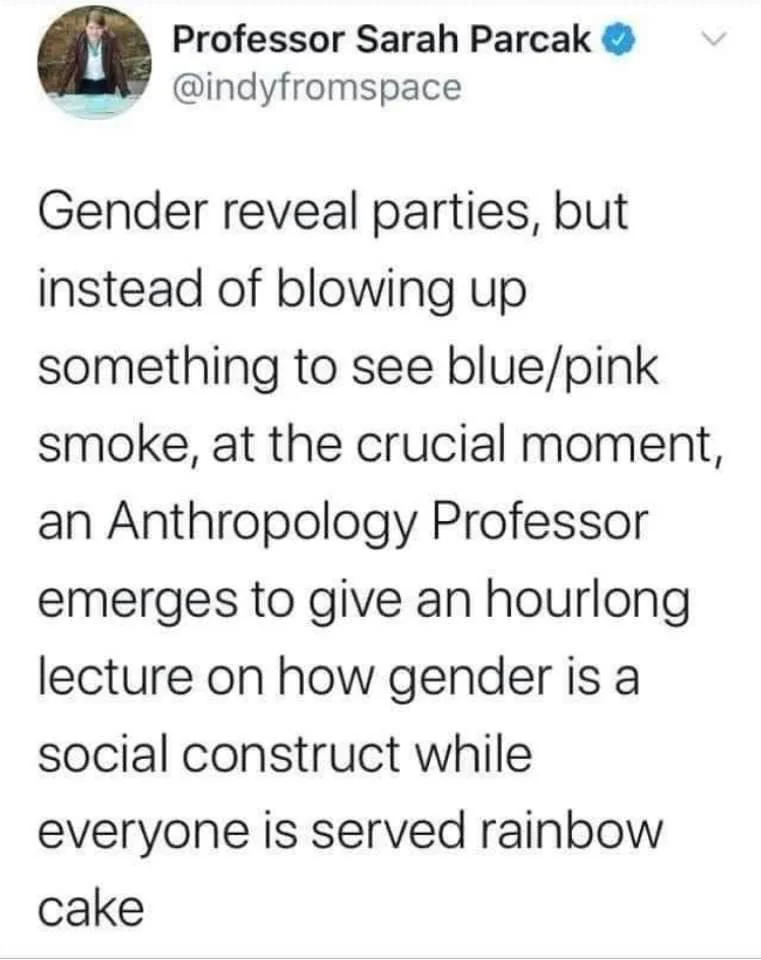this post was submitted on 14 Jan 2024
818 points (86.3% liked)
Science Memes
11473 readers
546 users here now
Welcome to c/science_memes @ Mander.xyz!
A place for majestic STEMLORD peacocking, as well as memes about the realities of working in a lab.

Rules
- Don't throw mud. Behave like an intellectual and remember the human.
- Keep it rooted (on topic).
- No spam.
- Infographics welcome, get schooled.
This is a science community. We use the Dawkins definition of meme.
Research Committee
Other Mander Communities
Science and Research
Biology and Life Sciences
- !abiogenesis@mander.xyz
- !animal-behavior@mander.xyz
- !anthropology@mander.xyz
- !arachnology@mander.xyz
- !balconygardening@slrpnk.net
- !biodiversity@mander.xyz
- !biology@mander.xyz
- !biophysics@mander.xyz
- !botany@mander.xyz
- !ecology@mander.xyz
- !entomology@mander.xyz
- !fermentation@mander.xyz
- !herpetology@mander.xyz
- !houseplants@mander.xyz
- !medicine@mander.xyz
- !microscopy@mander.xyz
- !mycology@mander.xyz
- !nudibranchs@mander.xyz
- !nutrition@mander.xyz
- !palaeoecology@mander.xyz
- !palaeontology@mander.xyz
- !photosynthesis@mander.xyz
- !plantid@mander.xyz
- !plants@mander.xyz
- !reptiles and amphibians@mander.xyz
Physical Sciences
- !astronomy@mander.xyz
- !chemistry@mander.xyz
- !earthscience@mander.xyz
- !geography@mander.xyz
- !geospatial@mander.xyz
- !nuclear@mander.xyz
- !physics@mander.xyz
- !quantum-computing@mander.xyz
- !spectroscopy@mander.xyz
Humanities and Social Sciences
Practical and Applied Sciences
- !exercise-and sports-science@mander.xyz
- !gardening@mander.xyz
- !self sufficiency@mander.xyz
- !soilscience@slrpnk.net
- !terrariums@mander.xyz
- !timelapse@mander.xyz
Memes
Miscellaneous
founded 2 years ago
MODERATORS
you are viewing a single comment's thread
view the rest of the comments
view the rest of the comments

It's a very interesting article. I broadly think its argument is sensible, but there's a couple of places I'd offer some dissent:
I think the idea of greater socialisation of child raising is framed as avoiding turning back the clock to a time when the nuclear family was stronger. I'd disagree with this framing of the suggestion; in many ways this is a return to tradition. Capitalism and the autonomy it represents has led to a loss of the kinds of community the author is describing. It has allowed the destruction of the 'village' in the idiom 'it takes a village to raise a child'. There is now enough wealth for parents to leave the extended family and the local community to form their own, isolated nuclear family, which I personally think can be damaging for children's socialisation.
I think the author makes a good point about 'gay' and 'lesbian' as identies having the space to exist as subcultures with the greater autonomy afforded under capitalism, but I would take issue with the suggestion that queer identities are only able to exist as a result of capitalism. There are numerous examples of historical transgender and homosexual identities, not just behaviours (e.g. two-spirit people in Native American culture).
Overall I think it's an interesting narrative and a good point about the distinction between homosexual behaviour and desires, and queer identity.